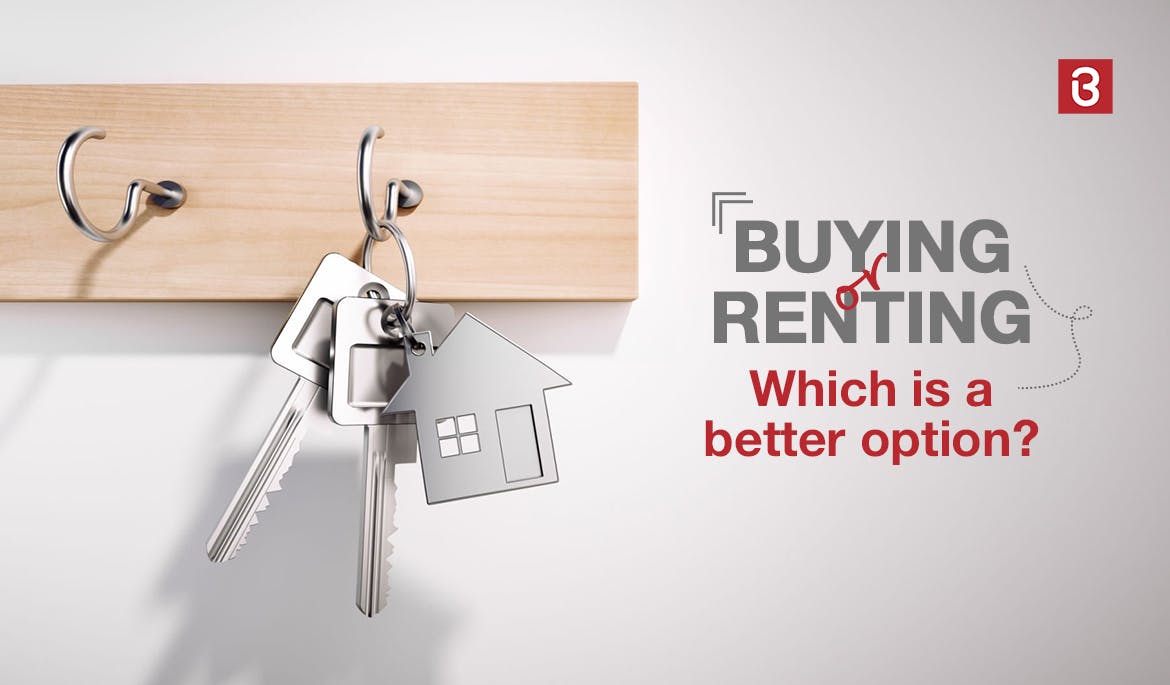Renting vs Buying – which is better?
In India, a house is seen as a symbol of stability, security, and prosperity, and is considered one of the most significant investments in our lives. While buying a real estate property was considered a sign of financial stability, many people have started opting for rental homes to match the new-age lifestyle. There are several reasons why someone may choose to buy or lease a house. Buying a house provides the opportunity to build equity, establish long-term stability, and have more control over the property. It is a good investment for those who plan to live in one place for a long time and have the financial resources to make a significant upfront payment. On the other hand, renting a house allows for more flexibility and mobility, as well as lower monthly costs and fewer maintenance responsibilities. It is a good option for those who want to avoid a long-term commitment or who do not have the financial resources to buy a house. Ultimately, the decision to buy or lease a house depends on individual circumstances, financial stability, and personal preferences. In this article, we will discuss the pros and cons of real estate buying and real estate renting to help you make an informed decision.
Pros and Cons of buying a house
Pros of buying a house
- Ownership: When you buy a house, you become the owner of the property and have complete control over it. You can make any modifications or renovations you like, within the limits of local laws and regulations.
- Equity: Over time, the value of your house can appreciate, allowing you to build equity and potentially sell the property for a profit.
- Tax Benefits: Homeowners may be eligible for tax deductions on mortgage interest and property taxes, which can lower the overall cost of homeownership.
- Stability: Buying a house provides a sense of stability and permanence, as you have a permanent place to call home.
Cons of buying a house
- Cost: Buying a house can be expensive, requiring a large down payment and closing costs, as well as ongoing costs like property taxes and maintenance expenses.
- Financial commitment: A mortgage is a long-term financial commitment, often lasting 30 years or more. This can limit financial flexibility, as it is difficult to sell the house or refinance the mortgage.
- Market fluctuations: The value of your house can fluctuate based on economic conditions, which can affect your financial security.
- Responsibility: Homeowners are responsible for maintaining and repairing the property, which can be expensive and time-consuming.
Pros and Cons of renting a house
Pros of renting a house
- Flexibility: Renting a house allows for greater flexibility and mobility, as you are not tied down to a specific property for an extended period. This can be beneficial for those who are unsure about their long-term plans or who may need to relocate frequently.
- Lower upfront costs: Renting a house typically requires a smaller upfront investment compared to buying a house, as you do not need to save for a down payment or pay closing costs.
- Maintenance and repair responsibility: Renting a house means that the landlord is responsible for maintenance and repairs, which can save you time and money.
- No property market risk: Renting a house means that you are not exposed to market fluctuations or changes in property values, which can affect the value of your investment if you own a house.
Cons of renting a house
- No equity: Renting a house does not provide the opportunity to build equity or own a property outright, which can limit your financial stability and security.
- Limited control: As a renter, you have limited control over the property and may not be able to make certain modifications or renovations.
- Cost: While the upfront costs of renting a house may be lower, ongoing monthly rent payments can add up over time, and may not provide the same long-term financial benefits as homeownership.
- Lack of stability: Renting a house means that you may need to move frequently, which can be disruptive and costly. Additionally, landlords may choose not to renew your lease, which can leave you searching for a new place to live.
The Verdict?
The decision of whether to rent or buy a house is a personal one, and the answer depends on individual circumstances and priorities. Renting can be a good option for those who are not yet ready to make a long-term commitment or who prefer greater flexibility in their living arrangements. On the other hand, buying a house can provide stability, the opportunity to build equity, and potential tax benefits. For some people, the cost of buying a house may be prohibitive, and renting may be a more affordable option. Others may prefer the security and peace of mind that comes with owning a home.
If you are looking to invest in a real estate project in Pune, then you must research the market and find properties that offer good potential for price appreciation and rental income. Bramha Corp is a trusted name in commercial and residential projects in Pune. It has projects at upcoming locations that make for ideal spaces to buy or rent apartments in Pune. You can look at THE COLLECTION and BRAMHACORP SMART at New Kalyani Nagar, BRAMHACORP TOWNHOUSE at Balewadi, or AUGUST TOWERS at New Kalyani Nagar. If you are interested in commercial projects, then you can consider properties like BRAMHACORP BUSINESS PARK at New Kalyani Nagar or BOULEVARD TOWERS at Pune Camp.
Ultimately, the choice between renting and buying a house will depend on a variety of factors, including your financial situation, lifestyle preferences, and long-term goals. It is important to carefully consider the pros and cons of each option and to understand your circumstances before making a decision.

